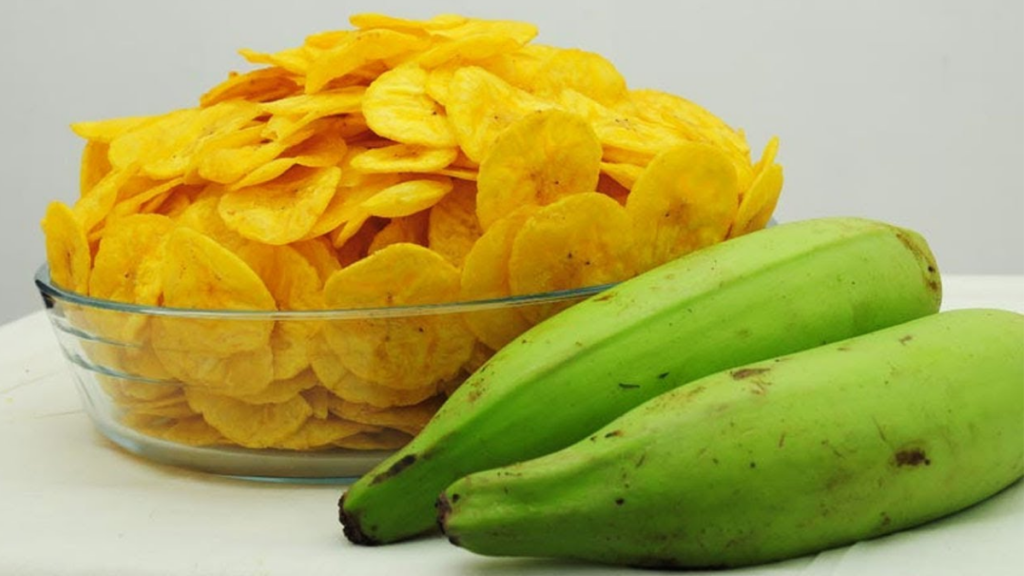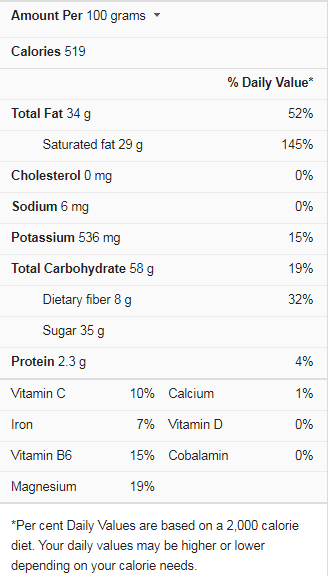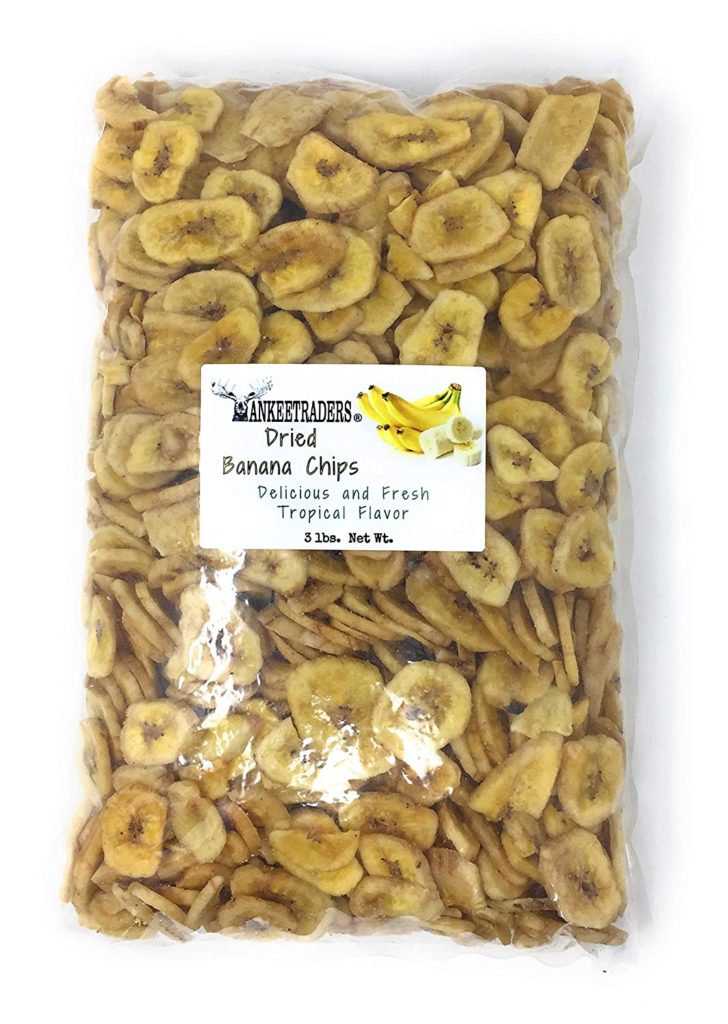Banana chips have a moderate calorie content. If you eat a 2,000-calorie diet, a 2.3-ounce portion has 519 calories or about 10% of your daily calorie intake. Carbohydrates and fat account for the majority of the calories (25 and 14 grams, respectively). Both of these nutrients are concentrated energy sources. That means banana chips can keep your body nourished between meals, but they can also cause weight gain if consumed in high quantities. You’ll gain some nutritional benefit for your calorie investment if you snack on banana chips. Some vital vitamins, particularly magnesium, are abundant in the chips.
Magnesium is required for energy production, cell-to-cell communication, and DNA synthesis, an essential component of cell proliferation. Magnesium also forms bone and tooth tissue with other minerals like calcium and phosphorus, so eating meals high in magnesium may help keep your skeleton strong. 19 mg of magnesium are found in a serving of banana chips. Depending on your gender, this amounts to 8 to 10% of your daily magnesium requirements.
Banana Chip Nutrition Facts
Banana Chips’ Health Benefits
- Bananas have a high fiber content but are low in calories. Bananas have a high fiber content calorie for calorie. With only 105 calories, one medium banana delivers about 7% of your daily recommended intake. Fiber is necessary for maintaining regular bowel motions as well as digestive health. Fiber consumption has also been related to a lower risk of heart disease, diverticular disease, and malignancies.
- Fiber consumption is also connected to lower body weight. In a 2009 study, 252 women’s dietary intake was tracked for 20 months. The researchers discovered that for every additional gram of fiber consumed per day, the women’s body weight decreased by 0.55 pounds (0.25 kg). According to scientists, fiber makes you feel fuller for longer, which may help you eat fewer calories in the long run.
- The higher the resistant starch content of a banana, the greener it is. The carbohydrate content of a banana is determined by how ripe it is. Unripe green bananas have a lot of starch and resistant starch, whereas ripe yellow bananas have largely natural sugars. Long chains of glucose (starch) resistant to digestion are resistant starches.
- They operate like soluble fiber and have various health benefits, including weight loss and lower blood sugar levels. Sugar absorption from foods can also be slowed by resistant starch, and this helps you feel full and keeps your blood sugar levels constant. Furthermore, resistant starch may boost fat burning.
Some Additional Factors
- The glycemic index (GI) is a metric that determines how quickly foods elevate blood sugar levels. A food with a GI of less than 55 is regarded to have a low GI. A medium score is 56–69, and a high score is 70 or more. Foods high in simple sugars are rapidly absorbed and have a high GI rating because they promote a rapid rise in blood sugar levels. Obesity, type 2 diabetes, heart disease, and stroke have all been related to eating many high GI foods. Foods with slower-absorbing carbohydrates have a lower GI and help maintain blood sugar levels.
- Bananas are a high sugar fruit that can cause blood sugar spikes because they contain 90% carbohydrates. On the other hand, bananas have a 42–62, depending on ripeness. This suggests they have a glycemic index of low to medium (31). The GI of ripe bananas is greater than that of green bananas. As the banana matures, its sugar content increases, affecting your blood sugar levels. Bananas appear to release their sugars slowly in general.
- Adding 9 ounces (250 grams) to participants’ breakfast for four weeks dramatically lowered their fasting blood sugar and cholesterol levels, according to one research on type 2 diabetes and high cholesterol. Bananas, which have a low GI, may also help you feel full and check your blood sugar levels, resulting in weight loss.
Are Banana Chips Better for you than Fresh Bananas?
Although banana chips provide critical vitamins and minerals, fresh banana is preferable. Compared to a banana, banana chips include a lot of saturated fat and many essential elements. Dehydrated bananas provide fiber, potassium, carbs, sugar, and calories four times a fresh banana ounce. They are, however, slightly higher in vitamin B-6 because it is a water-soluble vitamin. When appropriately prepared, homemade banana chips can be a nutritious snacking alternative.
Potassium, a mineral that helps lower blood pressure, can be found in this crispy snack. Bananas are also high in fiber, promoting digestive health and preventing constipation. Dehydrated bananas are a nutritious snack that is simple to prepare. These banana chips made at home will delight you. These dehydrated bananas or homemade banana chips are simple to create in the fruit and vegetable dehydrator. Adults and children alike will enjoy them.
Is the Sugar Content in Banana Chips High?
A syrup or honey coating is standard on banana chips, significantly increasing their yumminess and sugar content. A single cup of sugar contains 25 grams, most processed. On the other hand, a medium raw banana has roughly 14.5 grams of natural sugars. Total fat, saturated fat, calories, and sugar are higher in banana chips than in veggie or potato chips. However, keep in mind that these other chips aren’t as filling. You could consume more banana chips in a single sitting than banana chips. It’s all about the serving size.
A one-ounce serving (28g) of banana chips has around 23, making it a high glycemic food. When calculating a food’s impact on blood sugar, the glycemic load factor in portion size. Dieters recognize how close they are to being fat-free. If you eat dried banana chips in moderation and rinse your teeth afterward, they’re a relatively nutritious snack or dessert. On the other hand, fresh bananas provide the same nutritional benefits without raising your fat intake.
Our Banana Chips Healthy for Diabetics?
They are high in calories and should not be included in a diabetic diet. They are made using both unripe and ripe bananas. Salted banana chips are standard, as are banana chips covered with masala or jaggery. People with diabetes should avoid this deep fry because it contains salt and sugar. While banana chips appear to be healthy at first appearance, they can be high in calories, saturated fat, and added sugar. Look for dehydrated, non-fried banana chips manufactured without additional sugar as a healthier alternative.
Choose a whole banana instead. If you decide to consume banana chips, keep your portion size. A cup of banana chips contains significantly more calories, total fat, saturated fat, and sugar than potato chips. You read that correctly. However, regardless of whose chips you purchase, you must exercise caution and restrict your consumption. Choose baked banana chips over fried bananas with only herbs and spices for a healthier option.
Do Eating Banana Chips Make you Constipated?
Although some individuals believe bananas cause constipation, there is no solid evidence to support this belief. Would you like to boost your gut health. The most ideal banana variety for manufacturing chips is Nendran, which grows in South India? Raw Nendran bananas are traditionally skinned, sliced thinly, and deep-fried in coconut oil. They are delicious and delicious. While deep frying any meal is simple, Indian banana chips are unique.
You can fry any quantity of banana chips using the method described in the step-by-step post below. The caramelized sugar content of banana chips is to blame for their addiction. Aside from providing a happy sugar high,’ the nutty-crisp texture and delicate flavor provide a nutritious snack meal.
How Long do Banana Chips Last?
It has a shelf life of 6 to 12 months after opening. Instructions: 1 part banana to 3 parts water. Allow 20 minutes or until thoroughly rehydrated for Dehydrated Banana Chips. Because they are deep-fried in oil, they have a relatively short shelf life of up to 2 months when stored properly. The oil will become soft if the crisps are not stored in airtight containers. Dried chips are a more nutritious option. Raisins, craisins, prunes, dry cherries, dry apricots, dry mangoes, and dry blueberries can be stored in the pantry for up to a year. Dry dates, dry figs, and banana chips will keep in the pantry for at least three months after the sell-by date. Refrigerating these things can help them last up to two years longer.
How do you Keep Banana Chips Fresh?
Allow the chips to cool completely before storing them in an airtight container. I put the chips in freezer bags and kept them there. The chips ‘ quality will endure longer in a cool/cold dark storage place (freezer). The chips are perfect for nibbling or adding a surprise pleasure to meals. Keep the bags out of direct sunlight and in a cool area. Because the fried chips have a short shelf life of roughly two months, make sure they are sold or consumed quickly.
Banana chips that have been sun-dried are a favorite snack. The banana slices are dried on trays in the sun to make them. Some fruits, such as bananas, can be pretreated to prevent browning. To avoid the dried banana chip turning a dark brown to black hue during the dehydration process, treat the sliced bananas with lemon juice or a product like Fruit Fresh.
Conclusion
The potassium content of bananas contributes to their high health reputation. Banana chips also contain potassium. However, they may be less than you think. Each dose contains 536 milligrams of potassium, around 5% of the daily potassium requirement. Potassium has several health benefits, including nerve and muscular support and blood pressure-lowering qualities. However, if you want to obtain your potassium while consuming fewer calories, eat a fresh banana.
Many commercially available banana chips are fried and sweetened, resulting in a high fat and sugar content. While fat isn’t always harmful, you’ll consume approximately 29 grams of saturated fat, which isn’t good for your heart. Worse, added sugar in banana chips has been related to obesity, heart disease, and diabetes. As a result, banana chips are best savored on rare occasions. If you want something crunchy, unsalted almonds or walnuts are a good choice.




